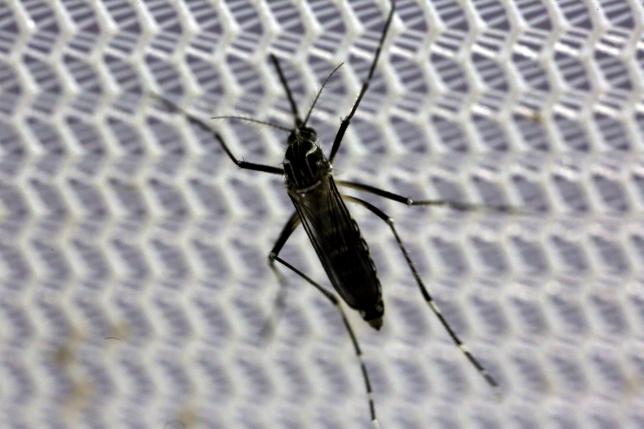Scientists' path to usable Zika vaccine strewn with hurdles
LONDON: The world is once again asking scientists and drugmakers to come up rapidly with a vaccine for a viral disease that, in the latest case, few people had heard of until a few weeks ago, and even fewer feared.
Making a shot to generate an immune response against Zika virus, which is sweeping through the Americas, shouldn't be too hard in theory. However, producing a safe, effective and deliverable product to protect women and girls who are at risk is not easy in practice.
For a start, scientists around the world know even less about Zika than they did about the Ebola virus that caused an unprecedented epidemic in West Africa last year. Ebola, due to its deadly power, was the subject of bioterrorism research, giving at least a base for speeding up vaccine work. This time, the knowledge gap is more daunting.
There are just 30 mentions of Zika in patents, against 1,043 for Ebola and 2,551 for dengue fever, according to Thomson Reuters Derwent World Patents Index. And there have been only 108 high-profile academic papers on Zika since 2001, against more than 4,000 on Ebola, as found in the Web of Science.
Still, the US National Institutes of Health, the Public Health Agency of Canada and the Butantan Institute in Brazil have started work on potential candidates for a Zika vaccine, and several biotech firms are in the race.
They include NewLink Genetics, which helped develop the first successful Ebola vaccine with Merck & Co.
Importantly, there is now a "big gun" vaccine maker with skin in the game: Sanofi said on Tuesday it will launch a Zika vaccine programme, a day after the World Health Organization declared the disease and its suspected links to birth defects an international health emergency.
Japan's Takeda Pharmaceutical also said on Wednesday it had created a team to investigate how it might help make a vaccine, while GlaxoSmithKline is concluding feasibility studies to see if its vaccine technology could be suitable.
Canadian researcher Gary Kobinger told Reuters he believes an experimental Zika shot might be able to be used on a limited emergency basis as soon as late 2016, although full regulatory approval will take years.
Ben Neuman, an expert on viruses at Britain's University of Reading, says there are many hurdles ahead. "To be useful, a Zika vaccine would need to be effective and safe, but it's difficult to do both," he told Reuters. "It's a balancing act."
That's because a good vaccine works by provoking the immune system into a strong response - but not enough to make a person sick - and there is no simple way to assess the right immune response for Zika, according to one drug company expert.
Zika infection is so mild in the vast majority of cases that its victims are unaware they are even infected, so this group of potential patients is unlikely to need or want immunisation.
The crucial target group is women who may be pregnant, since the disease's greatest suspected threat is the possible link to severe birth defects.
CLINICAL TRIALS
All of this makes developing and testing a vaccine highly complex, especially since pregnant women are often excluded from clinical trials until the safety of new drugs or vaccines is well-established in other population groups.
"It raises special safety considerations in vaccine development because you want to make sure any vaccine is safe for both mother and child," Takeda's vaccine head Rajeev Venkayya told Reuters.
It also makes for an uncertain and potentially limited market for any Zika vaccine. Assuming Sanofi or another company succeeds in developing one, the vaccine may be used only in teenage girls - protecting them before they are likely to become pregnant - in countries and regions where Zika-carrying mosquitoes thrive.
"It's a public health good initiative, it's not necessarily a commercial initiative," said Berenberg Bank analyst Alistair Campbell. "Zika is something that has cropped up suddenly and may well dissipate, so there may not be a sustainable annual cohort of patients for vaccination."
Still, the WHO and other public health authorities will be relieved that one of the world's top drugmakers, Sanofi, has pledged to work on a vaccine and other big players may soon join the effort.
Ultimately, developing vaccines is a question of priorities, as evidenced by a patchy pattern of protection against a range of mosquito-borne viruses over the past 80 years.
There was early success with the development in 1938 of the first vaccine against yellow fever, which belongs to the same virus family as Zika. More recently, drugmakers have successfully developed shots against Japanese encephalitis and dengue.
The first dengue vaccine, from Sanofi, was approved in December - after 20 years' work.
Work on other mosquito-borne diseases such as West Nile fever and chikungunya is still underway.
One idea for tackling Zika is to adapt vaccine prototypes for dengue and West Nile, using them as a "platform" for the Zika virus. But even this approach would not be simple. "For most viruses, there are lots of ways to make a somewhat effective vaccine, but the most effective vaccines target several parts of the virus in different ways," said Neuman. Multiple targets give the immune system more options, meaning more people are able to develop immunity. Yet an effective vaccine in most people may pack too much punch for others, with the potential to trigger birth defects.
"It's big concern," Neuman said. "And at this stage we just don't know."






